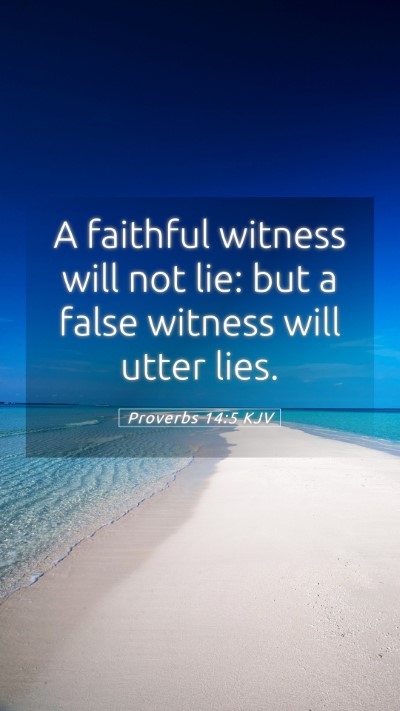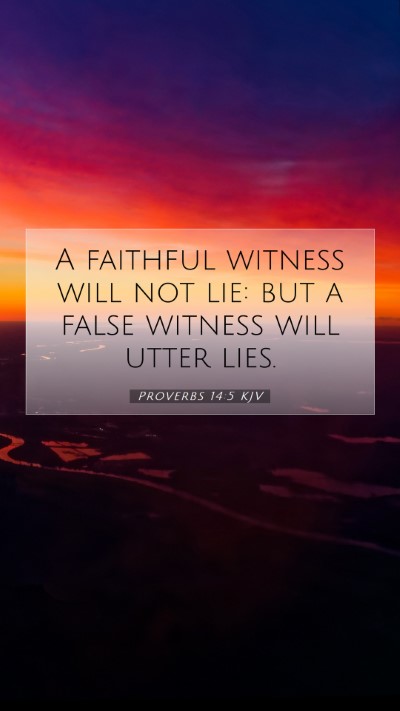Understanding Proverbs 14:5
Proverbs 14:5 states: "A faithful witness will not lie: but a false witness will utter lies."
Overview of Proverbs 14:5
This verse highlights the contrasting characteristics of a faithful witness against that of a false witness. It emphasizes the importance of truthfulness in representation and the consequences of deceit.
Bible Verse Meanings and Interpretations
To gain a deeper understanding of this verse, we can draw insights from several public domain commentaries:
-
Matthew Henry:
Henry emphasizes the virtue of honesty, positioning the faithful witness as a paragon of integrity. He explains that a truthful witness not only refrains from lying but actively supports justice and righteousness. In contrast, he notes the destructive nature of false witnesses, who spread deception and can undermine societal order.
-
Albert Barnes:
Barnes elaborates on the societal implications of this verse, suggesting that a truthful witness is foundational for justice and fairness. He notes that a false witness not only harms individuals but can lead to broader injustices within communities. Thus, the verse serves as a warning against the perils of dishonesty.
-
Adam Clarke:
Clarke focuses on the characteristics of a faithful witness, stating that such individuals possess a commitment to truth and are reliable in testimony. He points out that the lie of a false witness can have devastating effects, potentially leading to wrongful condemnation and societal discord.
Key Themes in Proverbs 14:5
Several key themes emerge from this verse:
- Truthfulness: The virtue of being truthful is paramount, reflected in the role of a faithful witness.
- Integrity: A faithful witness embodies integrity, which is critical for establishing trust and justice.
- Consequences of Lies: The acts of deceit perpetrated by false witnesses can lead to injustice and suffering.
Application of Proverbs 14:5 in Daily Life
Understanding Scripture such as Proverbs 14:5 can have practical applications
in daily life, including:
- Upholding honesty in personal and professional relationships.
- Being mindful of the consequences of spreading rumors or falsehoods.
- Encouraging a culture of truthfulness within communities.
Related Bible Cross References
-
Exodus 20:16: "Thou shalt not bear false witness against thy neighbor." This verse reinforces the command against dishonesty and deception.
-
Proverbs 12:17: "He that speaketh truth sheweth forth righteousness: but a false witness deceit." Similar to Proverbs 14:5, it emphasizes the contrasting nature of truth and lies.
-
Revelation 21:8: "But the fearful, and unbelieving, and the abominable, and murderers, and whoremongers, and sorcerers, and idolaters, and all liars, shall have their part in the lake which burneth with fire and brimstone." This scorning of liars underlines the severe consequences of dishonesty.
Conclusion
Through Proverbs 14:5, we are reminded of the vital role truthfulness plays in maintaining justice and integrity. By examining this verse through the lens of various commentaries, we understand its implications not only for our lives but also for society as a whole. By committing ourselves to truth, we contribute to a more just and trustworthy world.


